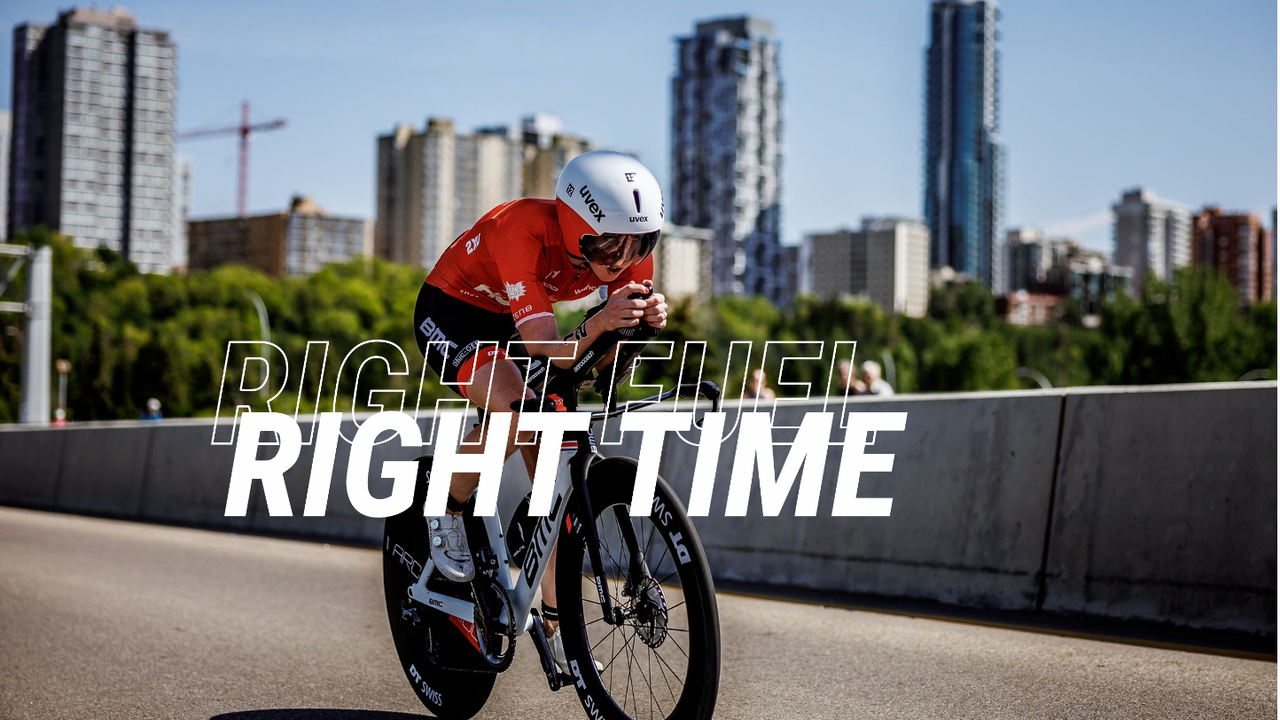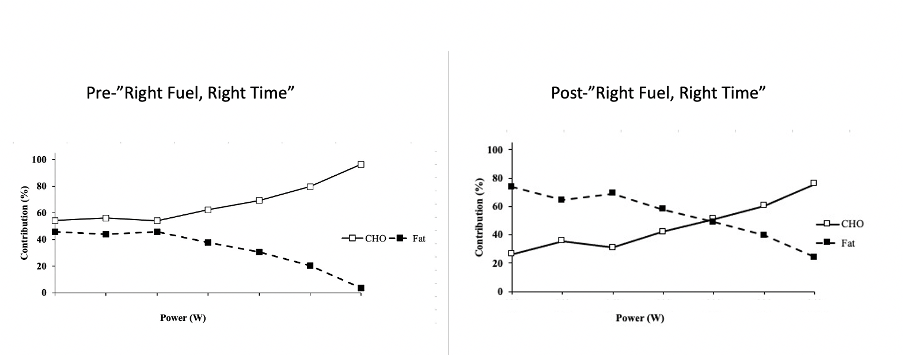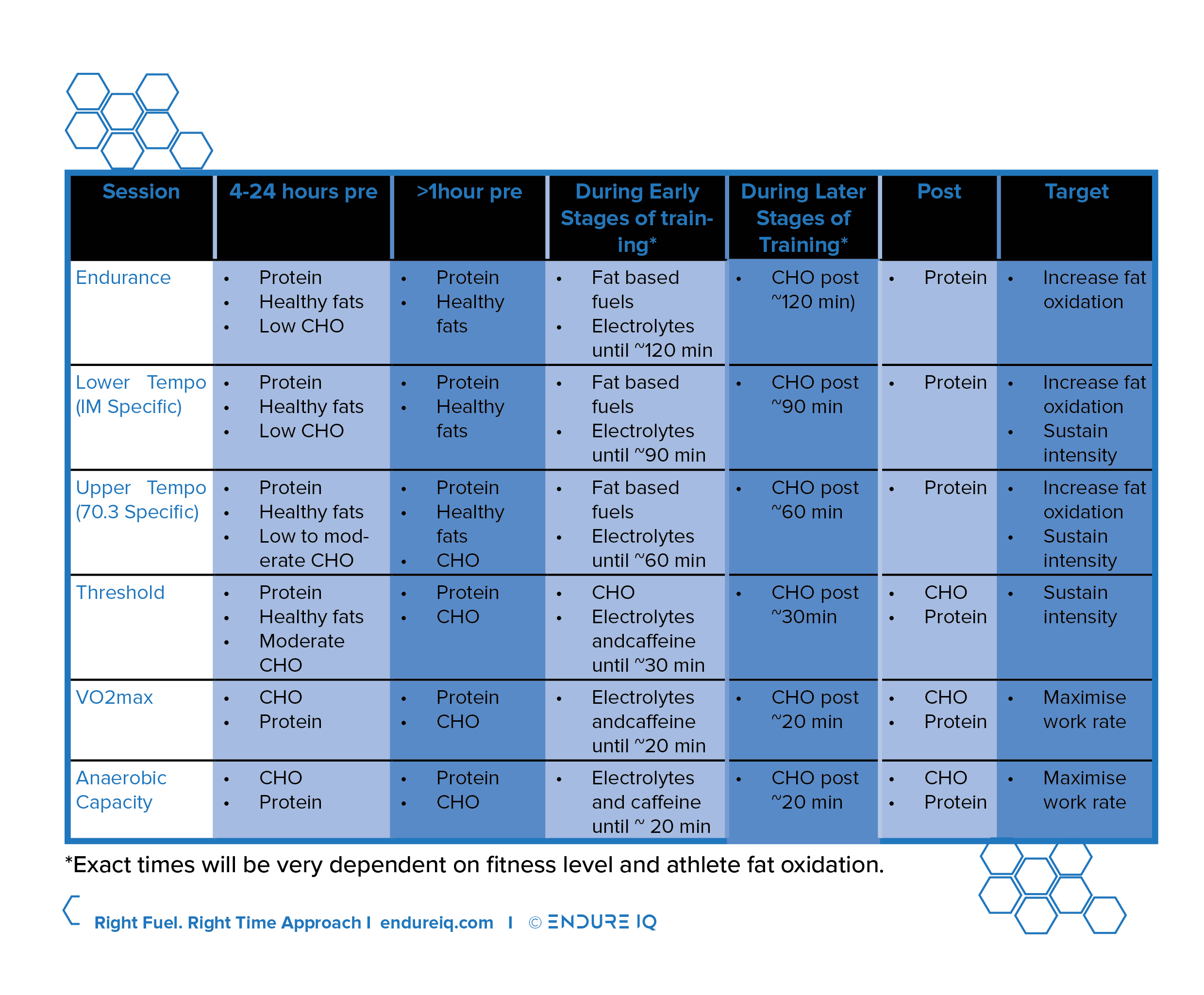Right Fuel, Right Time – Carbohydrate Manipulation to Make Every Session Count!

One of the hot topics in endurance sports nutrition at the moment is ‘carbohydrate periodization’ (4, 6).
What is carbohydrate periodization?
Like training periodization, in which we manipulate our training programming to best achieve our training objectives, carbohydrate periodization is a nutrition strategy in which carbohydrate intake is manipulated in line with training demands and to meet the objectives of individual sessions. These objectives may be to maximise acute performance within the session, or to facilitate high-fat oxidation rates, for example. We call this the ‘Right Fuel, Right Time’ approach. The rationale for this approach is that adequate carbohydrates should be consumed to support the quality of training sessions but that we should avoid overconsuming carbohydrates on easier, less demanding days, as this may blunt the signals that lead to positive adaptive responses (3).
In this blog, I will briefly discuss some of the research on the Right Fuel, Right Time approach and then walk you through my recommendations for implementing it in practice. Buckle up!
Our approach
As I have discussed many times on the blog, and in our courses, as long-distance triathletes, we need to train to improve our ability to make use of fat as a fuel source during exercise. Our other fuel source – carbohydrates – are limited in events like Ironman (7), so effectively accessing fat metabolism is vital for keeping us going during the run leg. Indeed, our ability to metabolise fat has been shown to relate to performance in long-duration exercise in research (2, 8).
To realise this objective, we need to consider the appropriate carbohydrate intake around training sessions designed to maximise fat oxidation, as high carbohydrate intake will blunt fat oxidation during exercise (1, 12). We might therefore recommend resisting significant carbohydrate intake before and during relatively easy training sessions targeted at eliciting high-fat oxidation rates.
My PhD student Jeff Rothschild and I recently performed a meta-regression, a statistical analysis of all the studies in this area, and found that diet around training was more important than carbohydrate intake during exercise and, interestingly, that the duration of exercise had a particularly large and positive effect on fat oxidation (10). This shows how a lower carb and higher fat diet around training will help with fat oxidation; indeed, habitual fat intake was a big driver of fat oxidation during exercise (10). Such data is one of the main incentives around the "Life" range at SFuels, making everyday lower-carb living easier for athletes. But with that said, given that carbohydrate intake during exercise can extend how long we can stick out there (11), we might recommend restricting carbohydrate intake during the early stages of endurance training. However, if this restriction begins to limit our ability to “go long”, then some carbohydrate supplementation in the later stages should be recommended. Remember that exercise duration is the most potent stimulant for fat oxidation; this is above specific macro-nutrient manipulation.
In other sessions, such as high-intensity interval training sessions targeted at producing the highest possible power output and increasing our V̇O2max, we are less worried about fat oxidation. In these sessions, we want to provide the muscle with the carbohydrates it needs to maximize high-intensity performance, so we might add some to our pre-exercise meal to ensure we are properly topped up. This approach is supported by another of our recent meta-regressions, which found that the activation of the protein AMPK – a key signal for training adaptation – doesn’t appear to be blunted by extra carbohydrate availability around very high-intensity sessions; it appeared that other signals, like lactate accumulation and the degree of acidosis generated by the exercise, overrode those signals and are the main driving factors (9).
High Carb or Low Carb Diet
As a coach, I have a reputation for being a low-carb promoter. But, in reality, this is not always the case. My approach is very specific to the athletes (pro vs age group), their personal interest in the low-carb diet, and the amount of training volume they do habitually or acutely. For example, I coach four high level pros, and only one of these is specifically low carb, with the rest taking a Right Fuel, Right Time approach. As we now know, improving fat oxidation is the most important outcome here, and the Right Fuel, Right Time approach can be very effective at producing the desired result. The data below shows the fat vs carbohydrate oxidation of Chelsea Sodaro in the time we have been working together. Notice the big rightward shift in the cross-over point. This shows how she can now use fat oxidation much more at higher power outputs. This was achieved by only taking the Right Fuel, Right Time approach.

Figure 1: Changes in % of fat vs carbohydrate oxidation (y-axis) at increasing power output (x-axis) pre vs post Right Fuel Right Time. Power output pre and post are identical, but data is protected.
When it comes to the carbohydrate periodization, the research mainly focuses on high carbohydrates diets, with specific carbohydrate restrictions around certain training sessions. Personally however, I believe this is fundamentally wrong approach for the majority of athletes. The better approach is to maintain a lower-carb diet, with specific carbohydrate injections around certain training sessions. After all, following polarized or pyramidal training intensity distribution means most of our training is performed at a low “fat-burning” intensity; and maintaining a lower carb diet habitually means dietary fat content will be increased (increasing fat oxidation (9)). Last this is also far superior for overall athlete health, wellbeing and body weight maintenance (5).
How to implement carbohydrate periodization according to your training
Let me now distil that down into a few key practical recommendations, summarised by session type (Endurance, Lower Tempo, Upper Tempo, Threshold, VO2max, and Anaerobic Capacity) in the Table below:
- Restrict carbohydrate intake around and during lower intensity activity with low glycolytic demand.
- Don’t be afraid to ingest carbohydrates during very long duration sessions (> around 90-120 min) targeted at improving fat oxidation, as this will help extend the duration of those sessions.
- During longer tempo-based session when intensity is clamped (e.g., between the first and second threshold), there may be more adaptation to be gained by restriction carbohydrate beforehand. Starting the session with lower muscle glycogen
- Fuel more intense sessions with a few extra carbohydrates to support training quality and maximise the stimulus for adaptation.
- Ensure adequate overall calories are always ingested, even and perhaps particularly on days when you are having lower carbohydrate intake.
So, give it try, and check out SFuels for all your Right Fuel, Right Time nutritional needs!
Table 1: An example of the Right Fuel, Right Time approach for typical training sessions performed by triathletes.

For more information on our online course, that explains in greater depth how to adopt a low-carb approach to your performance, check out our online course LDT101.
References
- Achten J, Jeukendrup AE. The effect of pre-exercise carbohydrate feedings on the intensity that elicits maximal fat oxidation. J Sports Sci 21: 1017–1024, 2003. doi: 10.1080/02640410310001641403.
- Frandsen J, Vest S, Larsen S, Dela F, Helge JW. Maximal fat oxidation is related to performance in an Ironman triathlon. Int J Sports Med 38: 975–982, 2017. doi: 10.1055/s-0043-117178.
- Hawley JA, Lundby C, Cotter JD, Burke LM. Maximizing cellular adaptation to endurance exercise in skeletal muscle. Cell Metab 27: 962–976, 2018. doi: 10.1016/j.cmet.2018.04.014.
- Impey SG, Hearris MA, Hammond KM, Bartlett JD, Louis J, Close GL, Morton JP. Fuel for the work required: A theoretical framework for carbohydrate periodization and the glycogen threshold hypothesis. Sports Med 48: 1031–1048, 2018. doi: 10.1007/s40279-018-0867-7.
- Maffetone PB, Laursen PB. Athletes: Fit but unhealthy? Sports Med - Open 2, 2016.
- Marquet LA, Hausswirth C, Molle O, Hawley JA, Burke LM, Tiollier E, Brisswalter J. Periodization of carbohydrate intake: Short-term effect on performance. Nutrients 8: 755, 2016. doi: 10.3390/nu8120755.
- Maunder E, Kilding AE, Plews DJ. Substrate metabolism during Ironman Triathlon: Different horses on the same courses. Sports Med 48: 2219–2226, 2018. doi: 10.1007/s40279-018-0938-9.
- Maunder E, Plews DJ, Wallis GA, Brick MJ, Leigh WB, Chang WL, Stewart T, Watkins CM, Kilding AE. Peak fat oxidation is positively associated with vastus lateralis CD36 content, fed‑state exercise fat oxidation, and endurance performance in trained males. Eur J Appl Physiol 122: 93–102, 2022. doi: 10.1007/s00421-021-04820-3.
- Rothschild JA, Islam H, Bishop DJ, Kilding AE, Stewart T, Plews DJ. Factors influencing AMPK activation during cycling exercise: A pooled analysis and meta-regression. Sports Med 52: 1273–1294, 2022. doi: 10.1007/s40279-021-01610-x.
- Rothschild JA, Kilding AE, Stewart T, Plews DJ. Factors influencing substrate oxidation during submaximal cycling: A modelling analysis. .
- Stellingwerff T, Cox GR. Systematic review: Carbohydrate supplementation on exercise performance or capacity of varying durations. Appl Physiol Nutr Metab 39: 998–1011, 2014. doi: 10.1139/apnm-2014-0027.
- Wallis GA, Rowlands DS, Shaw C, Jentjens RLPG, Jeukendrup AE. Oxidation of combined ingestion of maltodextrins and fructose during exercise. Med Sci Sports Exerc 37: 426–432, 2005. doi: 10.1249/01.MSS.0000155399.23358.82.
JOIN THE SQUAD
Take charge of your performance with proven training programs and workouts, adjustable to your needs, in the Endure IQ Training Squad.
LIMITED OFFER

